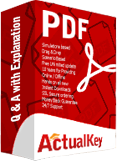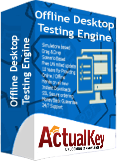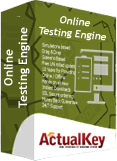Actualkey Prepration Latest Salesforce-Sales-Representative : Salesforce Certified Sales Representative Exam Questions and Answers PDF's, Verified Answers via Experts - Pass Your Exam For Sure and instant Downloads - "Money Back Guarantee".
| Vendor | Salesforce |
| Certification | Salesforce Sales Representative |
| Exam Code | Salesforce-Sales-Representative |
| Title | Salesforce Certified Sales Representative Exam |
| No Of Questions | 126 |
| Last Updated | May 22,2024 |
| Product Type | Q & A with Explanation |
| Bundel Pack Included | PDF + Offline / Andriod Testing Engine and Simulator |




ABOUT THE EXAM
The Salesforce Certified Sales Representative should have broad knowledge of the sales process and be proficient in planning, customer and prospect research, deal management, pipeline management, forecasting, and closing deals with value. Candidates should also have a detailed understanding of their customers, putting them at the center with a commitment to their success, leading with empathy.
Congratulations on taking the next step to prepare for your Salesforce Sales Representative credential. This exam guide has the information you need to help you study and prepare for your exam. Let’s get started!
Contents
About the Salesforce Sales Representative Credential
Audience Description: Salesforce Sales Representative
Purpose of This Exam Guide
About the Exam
Recommended Training and References
Exam Outline
Candidate Code of Conduct
Maintaining Your Certification
About the Sales Representative Credential
The Salesforce Certified Sales Representative certification exam is for individuals who want to demonstrate their knowledge, skills, and experience in the following areas:
Guiding discovery and research to create a sales plan.
Fostering key business relationships for customer engagement.
Engaging customers through each stage of the sales process.
Demonstrating thought leadership during all customer engagement.
Formulating and presenting solutions based on customers’ needs.
Handling objections and negotiations.
Gaining commitment to close deals.
Identifying pipeline generation and pipeline progression.
Applying knowledge of forecasting to drive opportunities and renewals.
Achieving customer success through order management and fulfillment, service and support, and customer value.
Audience Description: Salesforce Sales Representative
Salesforce Certified Sales Representative candidates exemplify sales excellence using a customer-centric methodology. The Salesforce Certified Sales Representative develops trusted relationships with their customers, ensures deal success by aligning with entire account teams, executive sponsors, and stakeholders, and takes full ownership of the sales process by planning, managing, and analyzing their business.
Salesforce Certified Sales Representatives’ skills span customer communication, research, discovery, team selling, value selling, and account planning and strategy. Candidates consistently manage their time and priorities, control personal development, create better team alignment, and grow confidently in their role as sales representatives. The Salesforce Certified Sales Representative has a detailed understanding of their customers, putting them at the center with a commitment to their success, leading with empathy.
Candidates for this exam should have 6 months to 3 years experience as a sales representative.
Purpose of This Exam Guide
This exam guide is designed to help you evaluate if you are ready to successfully complete the Salesforce Certified Sales Representative exam. This guide provides information about the target audience for the certification exam, recommended training and documentation, and a complete list of exam objectives—all with the intent of helping you achieve a passing score. Salesforce highly recommends a combination of on-the-job experience, course attendance, and self-study to maximize your chances of passing the exam.
About the Exam
Read on for details about the Salesforce Certified Sales Representative exam.
Content: 60 multiple-choice questions and up to 5 non-scored questions
Time allotted to complete the exam: 105 minutes
Passing score: 70%
Registration fee: USD plus applicable taxes as required per local law
Retake fee: USD plus applicable taxes as required per local law
Delivery options: Proctored exam delivered onsite at a testing center or in an online proctored environment. Click here for information on scheduling an exam.
References: No hard-copy or online materials may be referenced during the exam.
Prerequisite: None
Recommended Training and References
As preparation for this exam, we recommend a combination of hands-on experience, training course completion, Trailhead Trails, and self-study in the areas listed in the Exam Outline section of this exam guide.
The self-study materials recommended for this exam include:
Trailmix: Prepare for Your Salesforce Certified Sales Representative Credential
Coming May 4th!
Module: Cert Prep: Salesforce Certified Sales Representative
To review online Documentation, Tip Sheets, and User Guides, search for the topics listed in the Exam Outline section of this guide and study the information related to those topics. Documentation, Tip Sheets, and User Guides can also be accessed through Salesforce Help.
To continue developing your Salesforce skill set, visit Trailhead Academy to enroll in expert-led courses.
Exam Outline
The Salesforce Certified Sales Representative exam measures a candidate’s knowledge and skills related to the following objectives. Candidates should have sales knowledge and expertise in each of the areas below.
Planning: 21%
Describe the elements of territory planning.
Create an approach to engage key accounts.
Calculate sales quota attainability based on account, territory, and prospect insights.
Develop business relationships and build partnerships with key roles and personas.
Customer Engagement: 15%
Demonstrate thought leadership and build credibility to shift the customer's thinking.
Leverage multiple touchpoints to build prospect interest and align on why a solution meets their needs.
Nurture relationships and drive product adoption to maximize value for the customer.
Deal Management: 37%
Identify how to qualify a prospect and when to move to the next stage of the sales process.
Determine customer's business strategies, goals, initiatives, and challenges to define the scope of the solution.
Develop and present the value proposition of a solution based on customer needs.
Identify and remove all challenges to finalize the deal.
Gain customer commitment and close formal contract.
Pipeline Management: 12%
Identify and generate new pipeline.
Analyze pipeline health insights ensuring data integrity to improve customer relevance.
Explain pipe progression and stage velocity.
Forecasting: 6%
Assess forecast accuracy to drive opportunity consistency.
Measure the risks and opportunities associated with a business deal.
Explain key inputs that drive the forecasting process.
Customer Success: 9%
Identify the actions needed to book and fulfill orders.
Identify the post-sales customer journey.
Assess customer realized and expected value.
Exam Candidate Code of Conduct
At Salesforce, trust is our #1 value. Protecting the security of Salesforce Credentials is up to all of us. As a participant in the Salesforce Credentialing program, you’re required to accept the terms of the Salesforce Credential and Certification Program Agreement.
Participants in the Salesforce Credentialing Program should:
Use Salesforce-approved study materials available on Trailhead to prepare for your certification exam, including: certification exam guides, trailmixes/trails, Trailhead Academy courses, and Trailhead LIVE sessions
Collaborate with other Trailblazers in the Trailblazer Community by joining a Community group and finding a study buddy and/or mentor
Review and abide by the guidelines for online proctored and in-person certification exams
Submit a case with the Credential Security Team if you see any activity that undermines credential security
Maintaining Your Salesforce Certification
One of the benefits of holding a Salesforce credential is always being up-to-date on new product releases (updates). As such, you will be required to complete the Sales Representative certification maintenance module on Trailhead one time a year.
Don’t let your hard-earned credential expire! If you do not complete all maintenance requirements by the due date, your credential will expire.
QUESTION 1
A sales representative presents a solution and the customer is interested in moving forward.
How can the sales rep gain the customer's commitment and close the deal?
A. Negotiate to finalize the contract.
B. Propose and schedule an additional demo.
C. Develop a roadmap with complementary products.
Answer: A
Explanation:
Negotiating is the final stage of the sales process, where the sales rep and the customer agree on the
terms and conditions of the deal. Negotiating helps to overcome any remaining objections, address
any concerns, and close the deal with mutual satisfaction. Reference:
QUESTION 2
A sales representative is fulfilling an order using the step-by-step instructions for that specific customer
What are these instructions known as?
A. Fulfilment procedures
B. Standard operating procedures
C. Standard engagement steps
Answer: B
Explanation:
Standard operating procedures (SOPs) are detailed instructions that describe how to perform a
specific task or process. SOPs help to ensure consistency, quality, and compliance in fulfilling orders
for different customers. Reference: process
QUESTION 3
In which way should a sales representative drive trust through professional competency?
A. Asking questions to look for common interests, personal motivators, and hesitation
B. Collecting and processing information on products, competitors, and industries
C. Understanding the buyer's experience in the market and years of service
Answer: B
Explanation:
Professional competency is the ability to demonstrate knowledge and skills that are relevant and
valuable to the customer. By collecting and processing information on products, competitors, and
Salesforce-Sales-Representative Exam
QUESTION 4
A sales representative is preparing a presentation to showcase the value proposition of their solution to a prospect.
What should be the main objective of this presentation?
A. To provide an in-depth analysis of the prospect's competitors and market trends
B. To build credibility with the prospect using their public speaking skills and professional appearance
C. To communicate how the solution addresses the prospect's pain points and needs, and delivers tangible return on investment (ROI)
Answer: C
Explanation:
The main objective of a value proposition presentation is to show the prospect how the solution can
solve their problems, fulfill their needs, and provide them with benefits that outweigh the costs. A
value proposition presentation should highlight the unique features and advantages of the solution,
as well as quantify the expected outcomes and ROI for the prospect. Reference:
QUESTION 5
A sales representative closed a deal with a customer 6 months ago. The customer is now
experiencing issues with the solution and the sales rep is trying to assess the customer's realized value.
What should the sales rep do?
A. Acknowledge the customer's concerns while trying to find easier customers.
B. Reassess the customer's expected value based on the current situation.
C. Try to sell additional products or services to increase the realized value.
Answer: B
Explanation:
Realized value is the difference between the expected value and the actual value that the customer
receives from using the solution. If the customer is experiencing issues with the solution, the sales
rep should reassess the customer’s expected value based on the current situation, identify any gaps
or discrepancies, and work with the customer to resolve them and ensure their satisfaction.
Copyright © 2009 - 2025 Actualkey. All rights reserved.